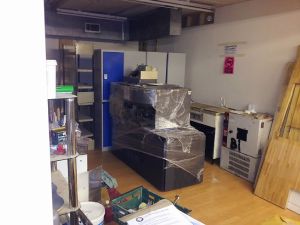Flow Cytometer: Difference between revisions
mNo edit summary |
mNo edit summary |
||
| Line 19: | Line 19: | ||
Imperial College donated a Flow Cytometer. | Imperial College donated a Flow Cytometer. It was donated as working, but in need of repair. However there is a lot of damage due to corrosion, which might be impossible to fix for a reasonable amount of time and money. | ||
'''Status:''' | The unit is too large to be stored in the biolab (1.8m X 0.8m = 1.44 square meters of floor space) and was previously moved to storage while we worked on it. | ||
'''Status:''' It's sustained damage to the sampling area, and we are missing some bits. Repairing is likely to be very $$$, so we are planning to dismantle it and use the optics and lasers on other projects. | |||
There are a number of large external units some of which are for providing power and cooling to the large laser. | There are a number of large external units some of which are for providing power and cooling to the large laser. | ||
There is a good description of how a flow cytometer works here; http://media.invitrogen.com.edgesuite.net/tutorials/4Intro_Flow/player.html | There is a good description of how a flow cytometer works here; http://media.invitrogen.com.edgesuite.net/tutorials/4Intro_Flow/player.html | ||
The machine requires a dust free environment due to it's use of lasers and optics. | The machine requires a dust free environment due to it's use of lasers and optics. | ||
Revision as of 15:42, 16 June 2014
Imperial College donated a Flow Cytometer. It was donated as working, but in need of repair. However there is a lot of damage due to corrosion, which might be impossible to fix for a reasonable amount of time and money.
The unit is too large to be stored in the biolab (1.8m X 0.8m = 1.44 square meters of floor space) and was previously moved to storage while we worked on it.
Status: It's sustained damage to the sampling area, and we are missing some bits. Repairing is likely to be very $$$, so we are planning to dismantle it and use the optics and lasers on other projects.
There are a number of large external units some of which are for providing power and cooling to the large laser.
There is a good description of how a flow cytometer works here; http://media.invitrogen.com.edgesuite.net/tutorials/4Intro_Flow/player.html
The machine requires a dust free environment due to it's use of lasers and optics.
I am currently looking to obtain a copy of the service manual.
Educationz
Harvard University extension school course on microfluidics, course notes
http://isites.harvard.edu/icb/icb.do?keyword=k41912&pageid=icb.page213804
Caltech course notes on microfluidics
http://thesis.library.caltech.edu/4796/3/02_Chapter_2.pdf
Cornell book on microfluidics
http://www.kirbyresearch.com/index.cfm/wrap/textbook/microfluidicsnanofluidics.html
Flow cytometry tutorial
This is a AV presentation describing the basics of the technology;
http://media.invitrogen.com.edgesuite.net/tutorials/4Intro_Flow/player.html
Practical Flow cytometry
This is an online version of the bible of Flow cytometry (Shapiro 2003)
http://www.coulterflow.com/bciflow/practical/book/index.html
Dako - flow cytometry
http://www.dako.com/08065_15dec05_guide_to_flow_cytometry.pdf
Microfluidics Links
Introduction to fluidics
